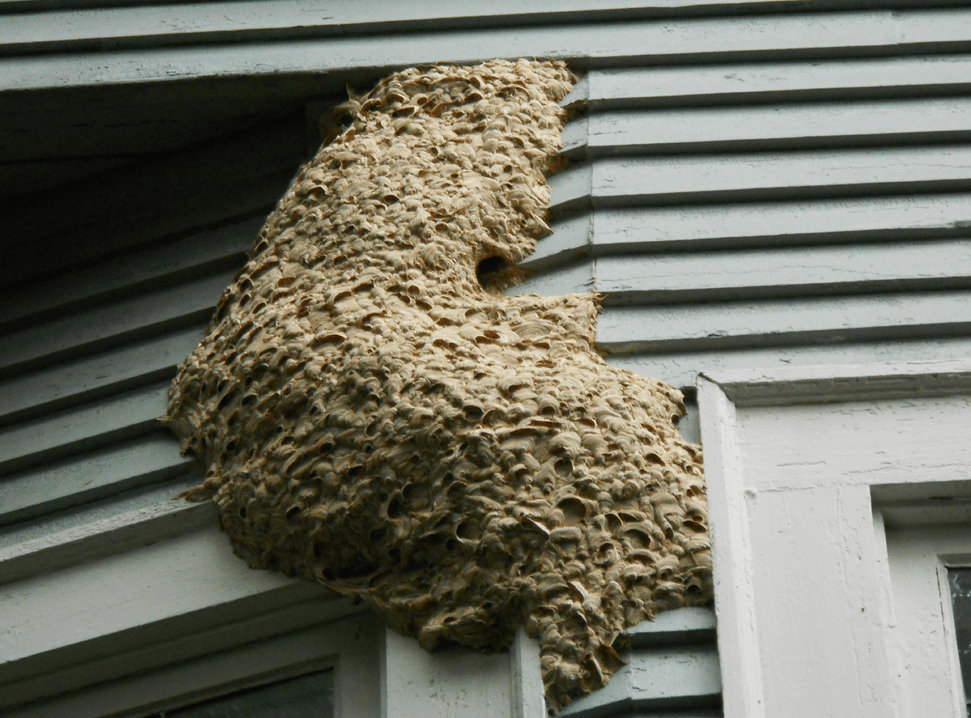Wasps tend to become more aggressive in late summer, and it lasts until the fall. By late summer, wasp colonies have reached their peak size. With more wasps in the colony, there’s increased competition for food, making them more aggressive when foraging.
Earlier in the season, wasps primarily feed on protein sources, such as insects, to help feed their growing larvae. As the season progresses and the larvae mature, the need for protein decreases. Adult wasps then start to seek out sugary foods, which become scarcer as natural sources diminish. This scarcity can make them more aggressive in searching for and defending food sources.
You do not want to live close to an aggressive nest of wasps. We asked two of our experts, Derrick Clay and Alex Gray, for tips on safely removing a wasp nest.
Expert tips to wasp nest removal

Derrick Clay
Derrick Clay is the district manager for Trutech Wildlife Service in Jacksonville, FL and Orlando, FL.

Alex Gray
Alex Gray is the district manager for Trutech Wildlife Service in Kansas City.
What are the most common wasps?
There are two types of wasps in North America- social and solitary.
Social wasps like the paper wasps live in colonies. They build nests from chewed fibers to tree limbs, the eaves of your house, or under your porch. Paper wasps are small and slender, but their sting is painful. They make small paper nests that look like an umbrellas.
Solitary wasps nest in the ground or natural cavities. An exception, Mud Dauber Wasps elect to build their nests with mud, molded into place with their mandibles.
Social wasps include
- yellowjackets
- bald-faced hornets
- paper wasps
Common solitary wasps are mud daubers and cicada killers. The difference between the two types is whether they live in a colony or not.
Derrick Clay
What is the biggest concer with wasps nests?
The biggest concern are the stings. Simply passing too close to a wasp nest can trigger an attack as the pests are very aggressive. Individuals who are allergic to their venom may go into anaphylactic shock when stung, which can be fatal if left untreated.
Derrick Clay
What are some natural ways to deter wasps from building nests?
- Keep sugar sources like hummingbird feeders away from areas you sit.
- Wasps need water to build their nests, ponds, fountains, even leaky hose pipes are places where they congregate. Use caution in those areas or remove the water source.
- Certain wasps like bald-faced hornets are territorial so hanging a fake wasp nest can keep them away but will only stop certain kinds. I have seen paper wasps use them as nests, so you might just be trading species there.
- Another option is just to leave them alone. If wasps build a nest in a remote area or high up in a tree, if you give them space they won’t bother you. They have just as much right to exist as squirrels and bunnies.
Alex Gray
Are there downsides to wasp sprays?
Wasp sprays are almost all knockdown insecticides that kill the current nest but do little for prevention. If the nest is large enough, some wasps can be protected from spray.
If it is water based then it can cause electrocution if the wasp nest is in a junction box or near a power source, as they often are. Oil-based solutions are safe for electrical use but can discolor wood and fabric.
Alex Gray
Do any plants repel wasps?
Almost all wasps drink nectar at some point, so some flowers will attract wasps. But they are not aggressive when feeding like this. If someone is allergic or terrified, I recommend plain landscaping.
Alex Gray
Are organic sprays more or less effective?
Organic is not the same as safe, it simply means the chemical is produced by plants rather than a lab. Always follow directions regardless of if it is organic or not.
If you want to use organic insecticide that’s fine, but don’t assume that it’s safer or better than chemical insecticides.
Alex Gray
What mistakes do people make trying to get rid of wasp nests?
One of the most common mistakes people make in getting rid of a wasp nest is doing it at the wrong time of day.
The best time to do it is early morning or late evening when temperatures drop. Another mistake is using wasp sprays incorrectly which can provoke them.
Derrick Clay

When should someone call a professional to get rid of a wasp nest?

Derrick Clay
When wasps build nests close to human activity that makes avoiding it impossible. Wasps nest near doors, windows, or under porches are especially dangerous. Wasps can also build nests inside walls or roofs. In that case, you need to get rid of the wasps, remove the nest, and then repair the damage.

Alex Gray
We recommend always calling a professional to get rid of wasp nests. When you should definitely not attempt DIY wasp nest removal: Large nests If it is in August-October. Wasps naturally become aggressive during this time. If treating the nest requires getting on a ladder or in an enclosed space where escape is difficult.
Wasp Nest Removal from Trutech Wildlife Service

To solve a wasp problem, you need to remove the nest. This can be difficult if the nest is built inside of your house. The pest control experts at Trutech Wildlife Service will locate the nest in or around your house and create a safe removal solution. Leaving a wasp nest can attract other pests like roaches, rats, and raccoons.
This can be difficult if the nest is built inside or in hard-to-reach areas. The pest control experts at Trutech will locate the nest in or around your house and create a safe removal solution Leaving a wasp nest can attract other pests like roaches, rats, and raccoons.
Wasp and hornet extermination is sometimes necessary to protect you and your family from painful and occasionally dangerous stings.
Without an effective wasp pest management program, there is a good chance the stringing insect problem will return. We will work with you to assess the stinging insect problem and develop an effective pest management program to keep hornets and wasps away.


